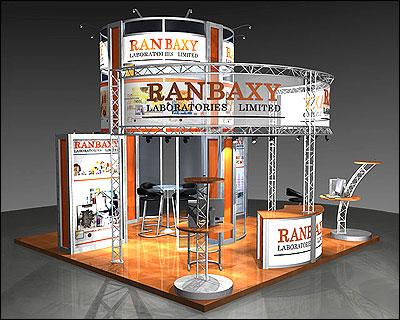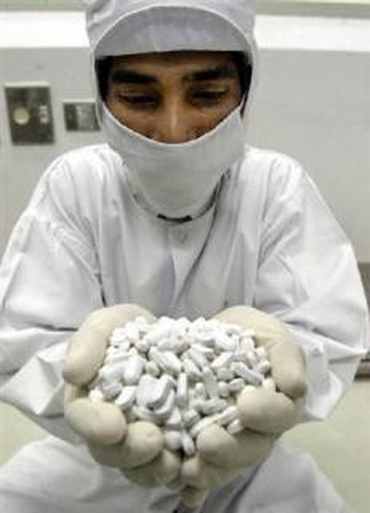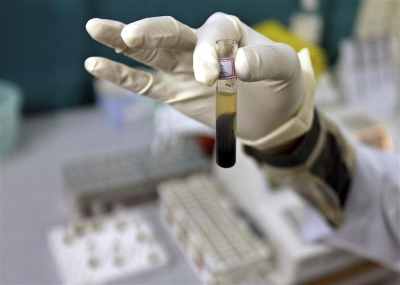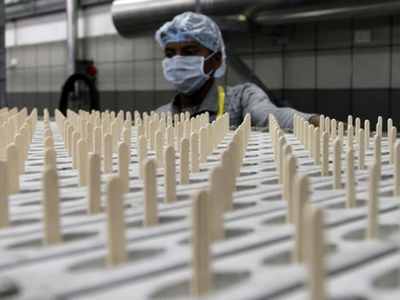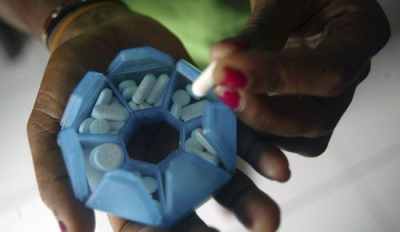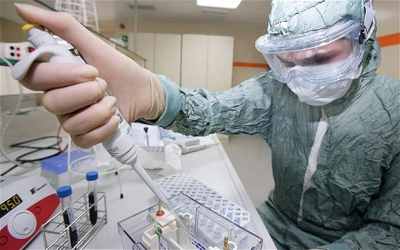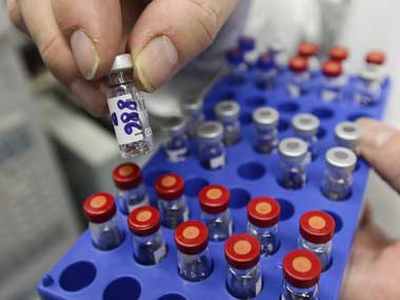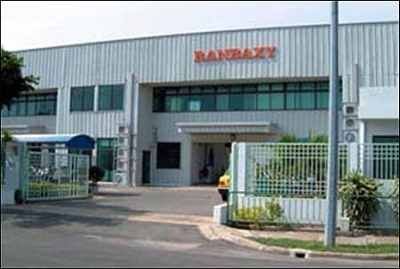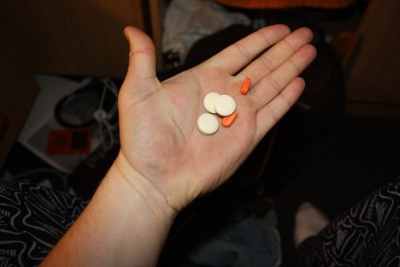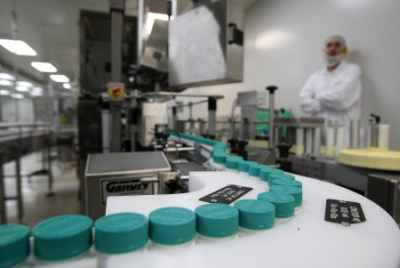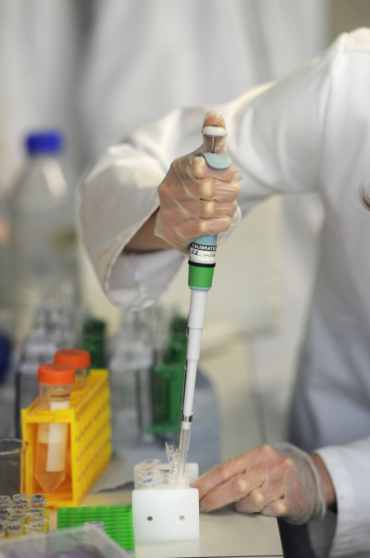 | « Back to article | Print this article |
Can Ranbaxy recover from its US debacle?
"We are pleased to have resolved this legacy issue with the FDA as we begin the next chapter in Ranbaxy's history," stated Arun Sawhney, CEO & Managing Director of India's biggest drug-maker Ranbaxy few weeks ago.
Sawhney's announcement came on December 21, after Ranbaxy signed a consent decree with the US Food and Drugs Administration (USFDA) -- the body that green lights the entry of all drugs into its markets -- to resolve all pending issues that his company has with the US regulator.
The announcement was widely regarded as the beginning of the end of Ranbaxy's three-year long troubles which got triggered after the US regulator found that Ranbaxy had compromised on certain manufacturing practices and falsified data to get medicine approvals for sale in that country.
For Rediff Realtime News, click here
Click NEXT to read more...
Can Ranbaxy recover from its US debacle?
Not only is this case a revelation of the complex, often torturous roads, pharma companies take in the hope of expanding in markets that are far from home, it also sheds some light on the risk that is shouldered while negotiating a foreign drug approval process that can often sink it.
It is still too early to definitively say whether Ranbaxy will bounce back quickly from its tangle with the USFDA but one thing is for sure: The drug company will have to work hard to regain its lost advantage in its biggest market.
Here's a refresher on how the whole thing began. In 2008, USFDA had originally banned the import of 30 drugs and stopped all future approvals from the pharma giant's troubled facilities, a situation that continues till today.
Ranbaxy later shut down one of its facilities (in the US), but has been working with USFDA to rectify the mistakes in the other ones situated in Dewas (Madhya Pradesh) and Paonta Sahib (Himachal Pradesh) in India.
Click NEXT to read more...
Can Ranbaxy recover from its US debacle?
The damage revealed
The consent decree was generally considered to be a comprehensive roadmap that settles the charges raised by USFDA and allows it to resume exports to the US market.
Separately, Ranbaxy had also said that it will make a provision of $500 million (nearly Rs 2,460 crore) in connection with the investigation by the US Department of Justice (DoJ), to resolve all potential civil and criminal liability.
CEO Sawhney's announcement in December appeared to radiate optimism about Ranbaxy's future -- indeed, it helped bolster Ranbaxy shares for almost a month after the statement. Then, the USFDA revealed specific details of the consent decree for the first time and the party ended.
What Ranbaxy had, in fact, not disclosed in its earlier announcement was the potential revenue it had foregone while agreeing to relinquish 180-day marketing exclusivity opportunities for three drugs in the US.
Click NEXT to read more...
Can Ranbaxy recover from its US debacle?
The market is rife with speculation as to which drugs these are. "We expect it to be generic Provigil, Diovan and Valcyte contributing sales to the tune of $186 million," Sushant Dalmia of Pinc Research stated.
Takeda's $4.5 billion diabetes pill Actos, Astra Zeneca's $5 billion hurt burn drug Nexium and several others are also supposedly on the list.
Which means the damage could be greater: It is estimated that Ranbaxy has, including the relinquished ones, 13 exclusive marketing opportunities that are at risk.
For generic companies operating in the US, such marketing opportunities are pure gold. The generic company that wins a chance to sell its drug by successfully invalidating the patent of someone else's medicine will have the sole rights to market the low-cost version of that drug for six months immediately after the products goes off patent. (After those six months, the floodgates are opened to any and all generics, pending approval).
Click NEXT to read more...
Can Ranbaxy recover from its US debacle?
In Ranbaxy's case, the company had recently landed such an opportunity as Pfizer's patent on cholesterol-lowering drug Lipitor had expired.
Here's how valuable this window of opportunity was: According to experts, Ranbaxy's revenues from Lipitor generic in just a six-month period may alone take care of the $500 million penalty provision for the company. Seeing its low-hanging fruits snatched away from it must have hurt.
So, if the signing of the consent decree was considered to be a move that brought in certainty in Ranbaxy's future business in the US, the eventual details of the decree and financial implications of the agreed clauses have done the reverse -- it has thrown doubts over the firm's business prospects in the world's most lucrative drug market.
Click NEXT to read more...
Can Ranbaxy recover from its US debacle?
Here's what the damage looks like to one industry watcher: "The terms of the consent decree have been stricter than our expectations and would be a long-driven process.
We believe that the affected ANDA (abbreviated new drug applications) list would include 30 products banned from the Dewas and Paonta Sahib plants along with 50 pending filings from the Ohm's lab (Ranbaxy's US subsidiary) and the newly approved Mohali plant.
Ranbaxy has to forego its 180 day exclusivity status on three ANDAs and the company is facing the risk of losing more if it fails to comply as per the USFDA standards", Sapna Jhavar of Reliance Securities notes.
Click NEXT to read more...
Can Ranbaxy recover from its US debacle?
However, for some, the problem with Ranbaxy is not just about the financial impact on its top line.
"Reasons for speculations about its business intent abound primarily because it has still not found the right balance in corporate disclosures. When in doubt, opt for full disclosures," says Sanjiv Kaul, a leading industry expert and a former Ranbaxy executive.
The repair job
The periodic disclosures made by Ranbaxy say that the company has been working closely with USFDA for the last three years to re-design its entire operations in the troubled and new production facilities. "You have a big brother watching over your shoulder", a person close to Ranbaxy said, hinting that USFDA has been monitoring each and every corrective step Ranbaxy has been taking during these years.
Click NEXT to read more...
Can Ranbaxy recover from its US debacle?
According to him, three high-profile US-based private consulting firms have been engaged with Ranbaxy to clear the mess.
While US-based PRTM Consulting was given the mandate to assist the company in the entire manufacturing process, Quintiles, another US firm guided Ranbaxy to ready the dossiers for submissions before USFDA.
Recently, Lachman Consultants has been assigned the task of overall monitoring of Ranbaxy's processes and filings and turn them fool proof, he said.
Click NEXT to read more...
Can Ranbaxy recover from its US debacle?
The company intends to make its newly commissioned manufacturing facility in Mohali, Punjab as the new hub of products headed for the US.
According to 2010 Annual Report (the company follows Jan-Dec accounting period), Ranbaxy had 135 product approvals in the US. There was an additional 70 drug applications that were under the consideration of USFDA.
A silver lining
The news is not all bad -- in fact, it may just turn out to be a blessing in disguise for the pharma giant.
Click NEXT to read more...
Can Ranbaxy recover from its US debacle?
"Ranbaxy's marketing applications for new products are all moved from its new Mohali plant. Even if the troubled manufacturing site at Poanta Sahib gets approved by USFDA, the company may not depend upon this facility, but concentrate on its Mohali plant and the manufacturing facility of its US subsidiary Ohm in New Jersy to avoid future risks. It means more capital investments, but then it's going to be fool proof", another Ranbaxy confidante said.
Also, with more than 65 per cent of its revenues coming from geographies other than the US, meeting the compliance requirements of USFDA will also signal Ranbaxy's credentials to regulatory authorities in other jurisdictions.
Click NEXT to read more...
Can Ranbaxy recover from its US debacle?
Of the Rs 8550.7 crore (Rs 855.07 billion) global sales the company registered in 2010 from its business in 125 countries, US contributed 32 per cent or Rs 2744.8 crore (Rs 27.44 billion).
Furthermore, Ranbaxy is no longer a standalone generic giant that aims at global growth. It carries the generic growth ambitions of its parent, Daiichi Sankyo, Japan's third biggest drug maker by market capitalisation. Daiichi had acquired 64 per cent stake in Ranbaxy for $4.6 billion just a few months before Ranbaxy's USFDA woes flared up.
"It may take few more years before Ranbaxy's troubled plants start making medicines for the US market. But once that happens, Ranbaxy will certainly have the best manufacturing facility and systems than any other generic competitor. Future should be far better for the company", a senior industry expert opined.
